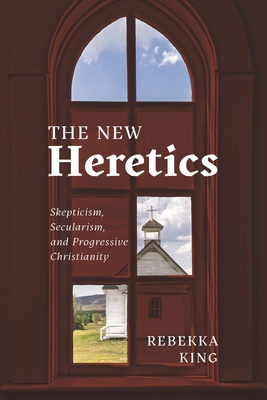The New Heretics: Skepticism, Secularism, and Progressive Christianity

The New Heretics: Skepticism, Secularism, and Progressive Christianity
Charts the development of progressive Christianity's engagement with modern science, historical criticism, and liberal humanism
Christians who have doubts about the existence of God? Who do not believe in the divinity of Jesus? Who reject the accuracy of the Bible? The New Heretics explores the development of progressive Christianity, a movement of Christians who do not reject their identity as Christians, but who believe Christianity must be updated for today's times and take into consideration modern science, historical criticism, and liberal humanism. Drawing on three years of ethnographic fieldwork in North America, Rebekka King focuses on testimonies of deconversion, collective reading practices, and the ways in which religious beliefs and practices are adapted to fit secular lives. King introduces the concept of "lived secularity" as a category with which to examine the ways in which religiosity often is entangled with and subsumed by secular identities over and against religious ones. This theoretical framework provides insight into the study of religious and cultural hybridity, new emerging groups such as "the nones," atheism, religious apostasy, and multi-religious identities. The New Heretics pays close attention to the ways that progressive Christians understand themselves vis-à-vis a conservative or fundamentalist Christian "other," providing context concerning the presumed divide between the religious right and the religious left. King shows that while it might be tempting to think of progressive Christians as atheists, there are religious and moral dimensions to their disbelief. For progressive Christians the act of questioning and rejecting God--alongside other theological tenets--is framed as a moral activity. Ultimately, the book showcases the importance of engaging with the ethics of belief in understanding contemporary Christianity.PRP: 218.32 Lei
Acesta este Prețul Recomandat de Producător. Prețul de vânzare al produsului este afișat mai jos.
196.49Lei
196.49Lei
218.32 LeiLivrare in 2-4 saptamani
Descrierea produsului
Charts the development of progressive Christianity's engagement with modern science, historical criticism, and liberal humanism
Christians who have doubts about the existence of God? Who do not believe in the divinity of Jesus? Who reject the accuracy of the Bible? The New Heretics explores the development of progressive Christianity, a movement of Christians who do not reject their identity as Christians, but who believe Christianity must be updated for today's times and take into consideration modern science, historical criticism, and liberal humanism. Drawing on three years of ethnographic fieldwork in North America, Rebekka King focuses on testimonies of deconversion, collective reading practices, and the ways in which religious beliefs and practices are adapted to fit secular lives. King introduces the concept of "lived secularity" as a category with which to examine the ways in which religiosity often is entangled with and subsumed by secular identities over and against religious ones. This theoretical framework provides insight into the study of religious and cultural hybridity, new emerging groups such as "the nones," atheism, religious apostasy, and multi-religious identities. The New Heretics pays close attention to the ways that progressive Christians understand themselves vis-à-vis a conservative or fundamentalist Christian "other," providing context concerning the presumed divide between the religious right and the religious left. King shows that while it might be tempting to think of progressive Christians as atheists, there are religious and moral dimensions to their disbelief. For progressive Christians the act of questioning and rejecting God--alongside other theological tenets--is framed as a moral activity. Ultimately, the book showcases the importance of engaging with the ethics of belief in understanding contemporary Christianity.Detaliile produsului










